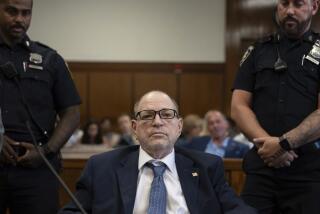Roman Polanski criminal case transcripts must be unsealed, court rules

An appeals court ruled Wednesday that transcripts related to Roman Polanski’s criminal case must be made public, a decision that could bring an end to a legal saga the acclaimed film director set in motion when he fled the U.S. after pleading guilty to sexually abusing a child in 1977.
One day after the Los Angeles County district attorney’s office said it was no longer opposed unsealing the records, the 2nd District Court of Appeal issued a three-page ruling accepting “the concession.”
Polanski, 88, his victim and journalists have asked judges over the years to unseal testimony given in 2009 by Roger Gunson, a retired deputy district attorney who was assigned to prosecute Polanski on charges that he sexually abused a 13-year-old girl.
Polanski’s attorney, Harland Braun, has long contended the transcripts show Gunson understood that L.A. County Superior Court Judge Laurence Rittenband intended for Polanski to remain in a state prison only for a 90-day evaluation after he pleaded guilty to raping 13-year-old Samantha Geimer.
Rittenband, who was presiding over Polanski’s case, said at the time that the evaluation period would help him reach a fair sentencing decision. The director ended up getting released after 42 days, with prison officials saying he did not need additional time in custody.
Facing fierce media pressure, Rittenband went against that recommendation and decided to send Polanski back to prison for an additional 48 days. But Polanski fled to France, where he holds citizenship. The French government refused to extradite Polanski, and he has never returned to the U.S.
The documents, Braun said, will make clear that Polanski has served his time and should be cleared of the possibility of more prison time if he ever returned to the U.S. either for the original crime or because he fled from justice.
Geimer — who has repeatedly asked for the records to be made public and to end the case against Polanski — accused the then-43-year-old director of bringing her to actor Jack Nicholson’s house for a photo shoot, serving her alcohol and drugs and then forcing himself on her. Nicholson was not home at the time.
It was not immediately clear when the transcripts would become available for public review. If Polanski were to return to the U.S., he could still face an additional two years in prison if prosecutors charged him with fleeing from justice. But it remains unclear if Los Angeles County Dist. Atty. George Gascón would file such charges.
Polanski has also been accused of sexually abusing several other underage girls. L.A. County prosecutors have declined to charge him in at least one of those cases because the statute of limitations had expired.
“We are pleased that the appellate court agreed with Ms. Geimer and our office about the need for transparency,” Gascón said in a statement. “This decision was a swift move toward upholding our commitment to the truth. We hope it allows the victim a small measure of assurance that the case is moving toward an outcome that will allow her to have some measure of closure in this decades-long litigation.”
Until Gascón said this week in a filing with the appeals court that he wanted Gunson’s testimony unsealed, he and his predecessors had resisted the idea. The district attorney’s office filed an opposition to a motion to unseal the records filed earlier this year by journalists Sam Wasson and Bill Rempel.
“These proceedings were not about Roman Polanski’s actions. They were about the First Amendment right of the public and press to know about what judges and prosecutors do in our courts, and the limits on the D.A. and Court in sealing that information,” said attorney John Washington, who represented Wasson and Rempel.
After learning of the court’s ruling, Polanski was “ecstatic,” according to Braun.
Once he obtains the transcripts, Braun said he plans to file a motion to have Polanski sentenced to time served. After that, Braun believes, the Oscar-winning director could be free to return to U.S. soil.
More to Read
Sign up for Essential California
The most important California stories and recommendations in your inbox every morning.
You may occasionally receive promotional content from the Los Angeles Times.











